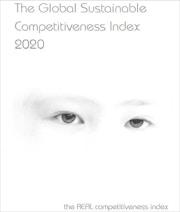
GDP and other economic measurements do not fully reflect current state of affairs and future development potential. Based on 127 quantitative data indicators, the Global Sustainable Competitiveness Index evaluates performance across the themes that define national competitiveness:
- Natural Capital
- Resource Efficiency & Intensity,
- Intellectual & Innovation Capital,
- Social Cohesion,
- Governance.
All indicators are based on data is derived from renowned sources (the World Bank, various UN databases, IMF, OECD). All data sets are scored for the latest available data as well as the development of trends (positive/negative) over the last 10 years to reflect both current standing and the future potential. The GSCI is an inclusive alternative to the GDP and can be used as basis for policy prioritisation.
Sustainable Competitiveness Index Results 2020:
- Sweden tops the GSCI for a 5th consecutive year, followed by Iceland, Denmark, Finland, & Switzerland
- UK is ranked 15, US is ranked 32, China 39
- North-East Asia (South Korea, Japan, China) keep dominating the Intellectual Capital sub-index
- Scandinavia tops the Social Capital sub-index
- Ghana is the highest-scoring African nation (60),
- The highest ranking South American nations is Costa Rica (27), followed by Uruguay (30), Chile (41), and Bolivia (46)
- Sovereign bond rating’s lack of ESG integration shows insufficient coverage of risks/opportunities in comparison to GSCI ratings
Analysis & breakdowns:
- Natural Capital: countries with high abundance of water, regardless of location and climatic zones, in general possess higher levels of natural capital, underlying the over-arching importance of the availability of clean and sufficient fresh-water resources
- Resource Intensity: lesser developed economies tend to rank higher on resource intensity. However, modern economies trimmed on efficiency paired with high percentage of renewable energy usage are lower in intensity when measured per economic output: high wealth levels and low resource intensity are not mutually exclusive outcomes.
- Intellectual Capital: Asian nations (South Korea, Japan, Singapore, and China) lead the Intellectual Capital ranking. However, achieving sustained prosperity in these countries might be compromised by Natural Capital constraints and current high resource intensity/low resource efficiency
- Social Cohesion: the Social Cohesion ranking is headed by Scandinavian and Northern European countries, indicating that Social Cohesion is the result of economic growth combined with social consensus
- Governance: the GSCI evaluates governance through measurable quantitative outcomes, not qualitative assessment of structures or policies. It is dominated many by European countries.
A detailed Report as well as individual country scores for 180 nations can be downloaded here.
A six-page report presenting key data and trends is now available for each country - visit here to download country reports.
Publish your content with EB Publishing
It's about who you reach. Get your news, events, jobs and thought leadership seen by those who matter to you.










